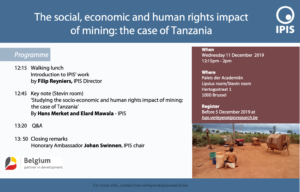IPIS kindly invites you to a presentation of its work on mapping the social, economic and human rights impact of mining in Tanzania. IPIS will present the results of its wide-scale mobile data collection on artisanal and industrial mining in northwest Tanzania. This presentation will shed light on the nature, scope and impact of mining in Tanzania and, more generally, on IPIS’ approach and methodology in undertaking data collection, mapping and analysis on natural resources.
The event will take place on Wednesday 11 December 2019, from 12:15 – 14:00, in the Palace of the Academies, Hertogstraat 1, 1000 Brussels.
Starting with a light walking lunch, IPIS director Filip Reyniers will introduce IPIS’ vision, work, priority areas and research methods.
In a key note, IPIS Tanzania project manager Elard Mawala and researcher Hans Merket, will elaborate on the work done in Tanzania. Firstly, IPIS undertook an unprecedented mapping of the nature, scope and impact of artisanal and small-scale mining (ASM) in Tanzania. The report, with its accompanying interactive webmap and open database, addresses challenges of the problematic safety record of ASM, gender and health issues, the problem of child labour, and the alarming use of toxic mercury in gold processing. The study also reveals the important – and often overshadowed – contributions of ASM. This includes considerable employment with relatively rewarding income, wealth spill-overs to local communities and sizeable corporate social responsibility contributions.
A second report addressed local community perceptions on industrial mining. To bring the voices of communities to the centre of the debate, IPIS conducted surveys on community perspectives in 32 villages near six industrial mines in Tanzania. Perceptions were assessed through the lens of the ‘social license to operate’ (SLO), which refers to the level of trust in and acceptance of mining companies by local communities. With the report, IPIS aims to contribute to a better understanding of the benefits and harms felt by communities nearby industrial mines, and of the bases of their trust or distrust This is essential for both governmental and corporate actors to inform their policies and practices on improving the societal impact and acceptance of industrial mining.
Thirdly, IPIS piloted a phone-based stakeholder engagement platform for Tanzania’s mining sector. The platform enables a two-way communication with communities working in and living around mining areas in northwest Tanzania. On the one hand, it allows a selected group of informants to anonymously report incidents occurring in the mining sector via their mobile phones. On the other hand, the platform can be used to send out mobile surveys on selected topics. In this way the platform can complement and update contextual data on the impact of the mining sector in a hands-on and prompt manner.
After a Q&A session, honorary ambassador and IPIS chair Johan Swinnen will close the event around 2pm.
Please register before 5 December with han.verleyen@ipisresearch.be.


